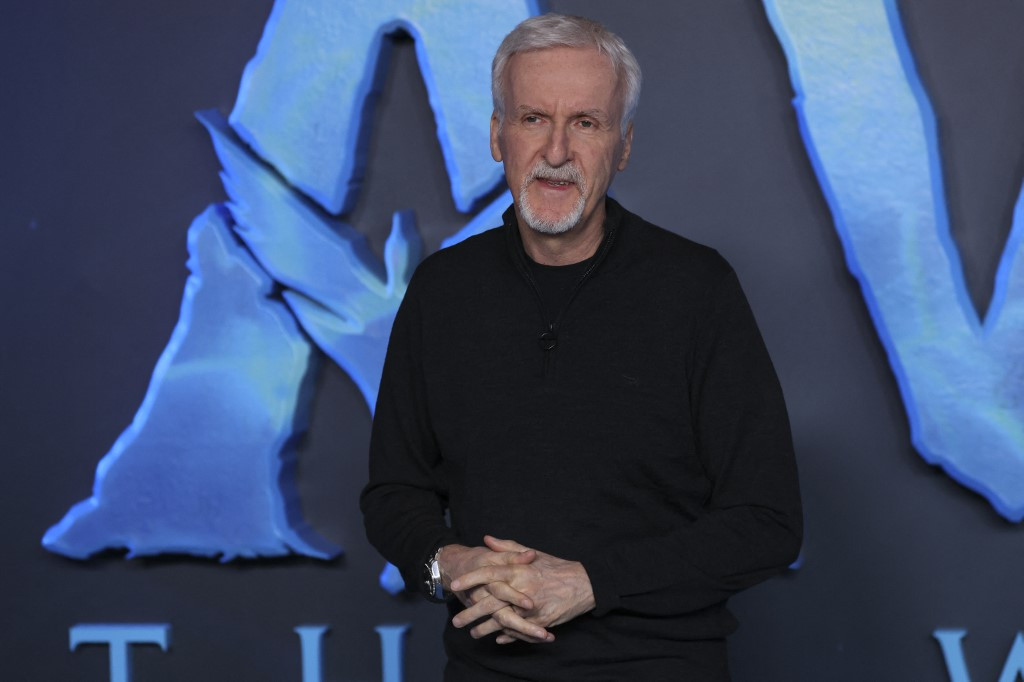Popular Reads
Top Results
Can't find what you're looking for?
View all search resultsPopular Reads
Top Results
Can't find what you're looking for?
View all search resultsAvatar’s James Cameron on art, AI and outrage
Change text size
Gift Premium Articles
to Anyone
 Return to Pandora: Canadian filmmaker James Cameron is captured during a photocall on Sunday for Avatar: The Way of Water in London. Cameron has pushed boundaries with artificial intelligence for Avatar, but emphasizes that human emotion must come first, because “technology does not create art. Artists create art”. (AFP/Isabel Infantes)
Return to Pandora: Canadian filmmaker James Cameron is captured during a photocall on Sunday for Avatar: The Way of Water in London. Cameron has pushed boundaries with artificial intelligence for Avatar, but emphasizes that human emotion must come first, because “technology does not create art. Artists create art”. (AFP/Isabel Infantes)
F
rom Terminator to Titanic to Avatar, director James Cameron has pushed Hollywood’s technical wizardry to new limits, but human emotion must always come first, he told AFP.
In an era when special effects were much more accessible to filmmakers and studios were willing to regularly spend hundreds of millions of dollars on blockbusters, it was artistic talent that made the difference, Cameron said during a visit to Paris.
Whether he can still strike the balance will be tested next week when the world finally gets to see Avatar: The Way of Water, the sequel to his groundbreaking extraterrestrial epic that has been 13 years in the making.
“Anybody could buy a paintbrush. Not everybody can paint a picture,” the Canadian director said. “Technology doesn’t create art. Artists create art, that’s important.”
It was originally hoped that the first sequel would be out in 2014, but Cameron’s gargantuan ambitions led to repeated delays.
He does not come across like the sort of megalomaniac director of Hollywood lore, describing his sets as “a big hippie commune with a bunch of really great artists”.
But these hippies are armed with some powerful computers.
“We had over 3,200 shots, which is a lot to maintain high quality, high quality control,” Cameron said.
“We brought in machine deep learning and plugged AI [artificial intelligence] into various stages of the process to assist us, [...] not to take the place of the actors at all but actually to be more truthful to what they had done,” he said.
‘Connection to nature’
The challenge was to draw emotion out of performances that were largely shot in front of green screens, where most of the scenery and props would appear only later in the effects booths.
“The heart, the soul, the emotion, the conflict, creativity [...] all that happens first, and then all the technical work begins,” he said.
Cameron has always justified the vast sums he has asked of studios – Titanic was both the most expensive and most profitable film of all time following its release in 1997, only to be topped by Avatar in 2009 – and he feels that responsibility “every day”.
“I can’t be whimsical or impulsive, I have to be very focused and dedicated to creating something that’s both pleasing to me artistically, and that I think will be pleasing to the public and commercial enough to make some money,” he said.
“It can’t be too intellectual, but I can make it satisfying to me by putting in secondary and tertiary levels of meaning that I know are there.”
Clearly, much of the impulse of the Avatar series is drawing attention to humanity’s impact on nature, but the sequel also focuses on Cameron’s aquatic interests.
Long fascinated by the sea, from 1989’s The Abyss to Titanic, Cameron became a deep ocean explorer for National Geographic in the 2000s and was the first solo human to visit the deepest underwater trench, the Mariana Trough, in a purpose-built submarine.
He sees Avatar as “awakening that thing in all of us, that connection to nature”.
“The movie asks you to feel something for nature [...]. It’s about maybe feeling a sense of outrage,” Cameron said.
“These Navi characters [...] they don’t look like us, they’re blue, they’ve got the ears and tails. But they represent the better angels of our nature.
“Maybe for 10 minutes after the movie’s over, you see the world a little differently,” he added.










